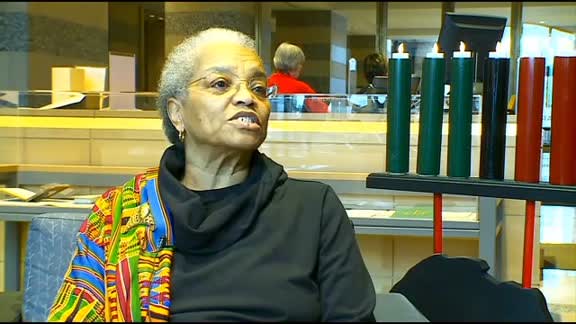 Daily Brew
Daily BrewHabari Gani! What Kwanzaa means in Canada

At this time of year, Canadians are accustomed to hearing traditional holiday greetings.
Most get “Merry Christmas,” though you’ll probably hear “Happy Hanukkah” a lot this week, and yes, also the banal, if universal, “Happy Holidays”. But mention “Habari Gani” and you’re likely to get a very unseasonal awkward silence. “Habari Gani” is Swahili for “What's the News?” and it’s the customary greeting of Kwanzaa.
Most people know that Kwanzaa is a celebration of some sort; it takes place during the Christmas season, and it somehow involves black people—but other than that they are pretty clueless.
Sani-Abu Mohammed Allen, an African-Canadian dance choreographer and founder of the Ijo Vudu Dance Company, has been celebrating Kwanzaa dutifully for the past 20 years.
“People get more interested to learn, or know more, when I tell them about Kwanzaa; some have never even heard of it before,” says the Nigerian-born performer.
The name “Kwanzaa” is actually a loose translation of the Swahili expression "matunda ya kwanza," or "first fruits of the harvest”—it’s based on the various harvest festivals that take place in Africa. Kwanzaa isn’t a religious holiday; it’s more of a cultural celebration running from December 26 to January 1. Contrary to popular belief it’s not meant to replace Christmas, Baby Jesus or Santa Claus—in fact most followers celebrate Kwanzaa alongside Christmas.
It began in 1966 by Dr. Maulana Karenga. The 25-year-old professor and militant black activist created the holiday for African Americans and Pan Africans worldwide to celebrate family, community and culture. At the time it was more of a response to the unsettled civil rights movement and the obstinate social climate of the U.S.
The 74-year-old Kagenga is now chair of Africana studies at California State University. He says the annual holiday is still a “deeply meaningful and special time of remembrance, reflection and recommitment” for the African community around the world.
How Kwanzaa is celebrated in Canada
The Black Canadian community is extremely diverse; it includes various groups of Afro-Caribbean descent, African immigrants, as well as descendants of immigrants from the U.S. However, the community still manages to find common ground in celebrating Kwanzaa.
It ties back to the principles of Kwanzaa, according to Allen, who describes the values of the annual celebration. A candle is lit on each day of Kwanzaa and each day is dedicated to one of the seven principles, which are meant to serve as fundamental values each family should adapt to in order to be healthy and happy:
Umoja (Unity)
Kujichagulia (Self-Determination)
Ujima (Collective Work and Responsibility)
Ujamma (Financial Support/Economics)
Nia (Purpose)
Kuumba (Creativity)
Imani (Faith)
“It’s a celebration for the community, friends and family,” said Allen. “It’s a celebration for all ages; where they all come together and share the seven principles of Kwanzaa.”
Pat Howell is president of the Markham African Caribbean Canadian Association. When her association holds Kwanzaa celebrations for the local community, it’s not extended over a seven-day long festival as it’s typically done in the U.S.
“We know that Kwanzaa begins on the 26th of December and goes to January 1, but because of how we do things—or how we do things in Canada—we don’t celebrate those days,” said Howell. She clarifies that her association holds a one night Kwanzaa celebration; a large function that includes music, speeches and information about what Kwanzaa is about. It’s a good way for Black Canadians, or anyone interested in learning more about the festive celebration, to participate in a Kwanzaa celebration.
“A lot of people believe that Kwanzaa replaces Christmas for Black people, and that’s not the truth at all. So we have to make sure it’s clear. We talk about the different concepts and what it is that we do to celebrate it,” said Howell, who adds that it’s normal for Kwanzaa and Christmas celebrations to mix together for many families, since both celebrations occur during the holiday season. “To say well, you know what, ‘this is the first day of Kwanzaa, this is what we do, this is the second day of Kwanzaa, this is what we do’—but when we come together to make sure that our community knows about it, to make sure they get all the information. And what they do with it is totally up to them,” added Howell.
By the numbers
It’s estimated that about 20 million African Americans, Black Canadians and Black people from around the world celebrate the annual cultural holiday—but that number fluctuates depending on the source. A 2004 National Retail Foundation Survey suggested that 1.6% of Americans polled celebrate Kwanzaa (about 4.7 million Americans). Dr. Karenga asserts that approximately 28 million people worldwide celebrate his founding holiday and the African American Cultural Center ups that number to 30 million worldwide.
Stats Canada states that 2.3% of people in Canada have reported their ethnic origin as African with 1.6% of people in Canada reporting their place of birth as Africa or a country within Africa—and that “Kwanzaa is marked by many people of African origin,”—although the exact number of Canadians who celebrate Canada wasn’t reported.
Kwanzaa seems to resonate with baby boomers compared to younger generations, according to an unofficial U.S. poll by The Root. Researchers discovered that 41% of respondents born between 1946 and 1964 celebrate Kwanzaa, while participants born in or after 1982 were least likely to celebrate the holiday.
To reach a younger Canadian audience, Allen suggests that Kwanzaa be taught more in schools. He’s further bringing awareness to the holiday through the Ijo Vudu Dance Kwanzaa celebration (this year taking place on December 27th). The annual celebration has been tradition for Allen since he first immigrated to Canada from the U.S. in 2005. Not surprisingly, the principles of Kwanzaa had helped him during this transition period.
“One personal experience of celebrating Kwanzaa for me is Kujichagulia; meaning to believe in myself, to have self-determination,” Allen noted.
“This (principle) has and still is taking me through my life.”




